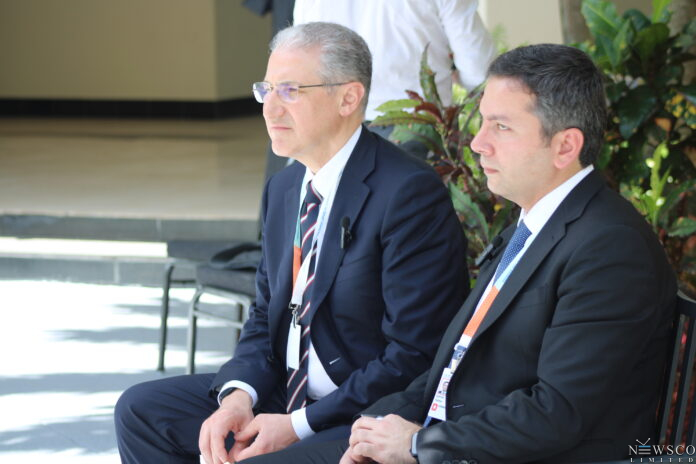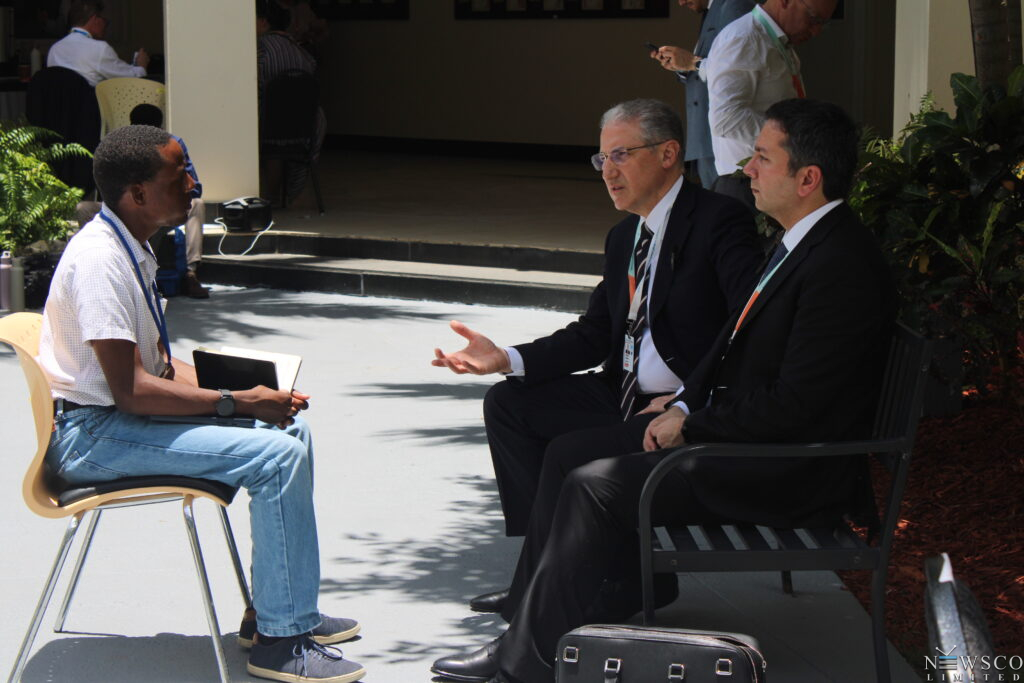

Designate for COP29, Azerbaijan’s Mukhtar Babayev, and Lead Negotiator Yalchin Rafiyev, spoke about how SIDS can be better supported.
By Robert Andre Emmanuel
The President Designate and the Lead Negotiator of COP29 are hoping that their efforts to support Small Island Developing States’ (SIDS) voices will be critical to advancing the climate financing agenda at COP29 set for later this year.
In an interview with Observer media on the sidelines of the SIDS4 conference, President Designate for COP29, Azerbaijan’s Mukhtar Babayev, and Lead Negotiator Yalchin Rafiyev, spoke about how SIDS can be better supported.
“This is a very good chance to visit the region, and to take part in this very important event. We already have had several meetings with a lot of countries to discuss a lot of things regarding the preparation for COP29, the expectations of countries regarding the climate forum in Baku, and what we can do together,” President Designate Babayev expressed.
“After 10 years, this conference is a good opportunity for the COP29 President and his team to meet with colleagues from Small Island Developing States to understand their expectations, to listen to them and to find joint solutions for the problems of the Small Island Developing States,” Lead Negotiator Yalchin Rafiyev added.
The COP29 summit has been billed as the ‘finance summit,’ with countries expecting to prioritise financing opportunities for climate justice initiatives like the Loss and Damage Fund, and the Green Climate Fund, and adaptation and mitigation initiatives to unlock new sources of funding to tackle climate change.
Probing them on how they plan to use their position as COP29 leaders to push for a more committed financial support for small islands like Antigua and Barbuda, they argued that it was not just a matter of increasing resources, but making it easier for small islands to access the resources—an issue that Prime Minister Gaston Browne yesterday spoke about with the Barbados Prime Minister, Mia Mottley, and UN Secretary General Antonio Guterres.
“You can have a lot of money, billions in the [Loss and Damage] funds, but if it’s not accessible, it is of no use.
“Therefore, our main task is, besides mobilising some resources for the fund, to talk to the Board of the Loss and Damage Fund to find a funding mechanism that is more suitable and accessible for the Small Island Developing States,” Rafiyev said.
According to Rafiyev, the Loss and Damage Board will be hold its third meeting in Baku from the 15 to 19 September to discuss how to ensure operationalisation of the fund.
With the Caribbean expected to have an extremely active hurricane season, which could see an increase in the severity of storms experienced by islands, the implementation of a Loss and Damage Fund will see the region being able to access financial support if storms cause major destruction to any of the islands.
There has been some criticism of Azerbaijan being chosen to host COP29, as it is a major oil and gas- producing State, as well as concerns over the level of accountability that oil-producing companies are held to for their impacts on the climate.
Prime Minister Gaston Browne, in his opening remarks, demanded that fossil fuel companies be held to account for their actions in worsening the climate crisis.
Observer media posed to the two men whether it is possible that the two issues —the economic viability of an energy-producing State and climate justice, could co-exist.
“Azerbaijan is a country with a big oil and gas history, but at the same time, the country has a huge renewable energy programme where Azerbaijan has changed our priorities and turned our economy to the green renewable energy.
“We created the special energy zones in the country with renewable energy corridors, and I think it is a priority for Azerbaijan, how the country can use these revenues coming from fossil fuel exports to invest in renewable energy, and not only to do it in our country, but also to assist other countries, and to invite the fossil fuel-producing countries to be more active in this process,” the COP29 President said.
“We should play the role of bridge-making between the producing and consumer countries to make sure that we understand each other, and it’s not an appropriate way to condemn or accuse a single part of the industry, there are a lot of emission-creating industries, and if we start blaming somebody for an emission, it will not yield any result.
“But we should continue to encourage all parties, including fossil fuel countries, the transportation industry and others to come together—provide more finance and means of implementation [that could be available] for the developing countries,” Rafiyev said.
The two leaders said that COP29 should be seen as the “enabling COP”—where countries take responsibility for the planet “regardless of the development level,” and that the right message to everybody is sent about the importance of our planet.

